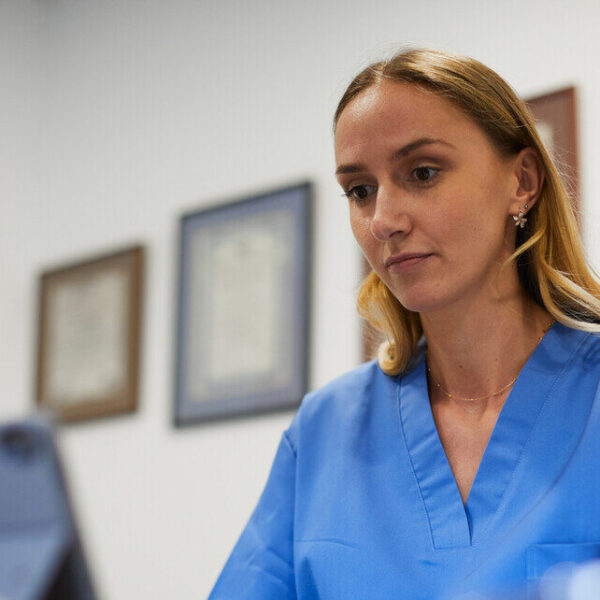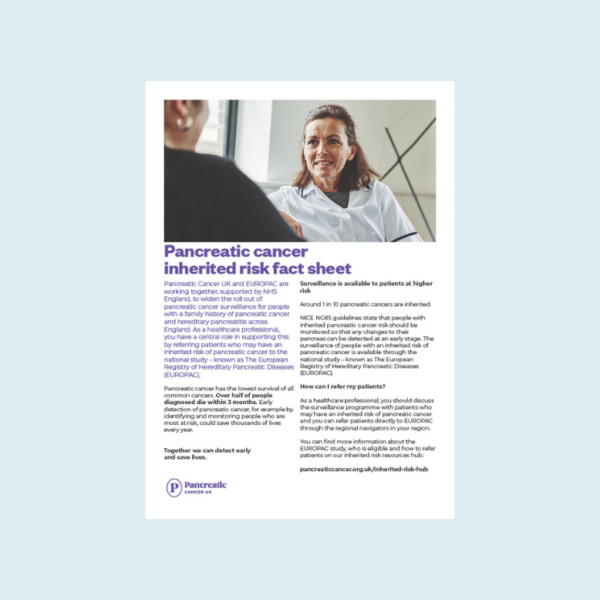

Online Family History Checker
Try out the online Family History Checker and share with your patients so they can check their eligibility and self refer for the EUROPAC study.
Pancreatic cancer has the lowest survival of all common cancers. Over half of people diagnosed die within 3 months. Early detection of pancreatic cancer, for example by identifying and monitoring people who are most at risk of developing this devastating disease, has the potential to save thousands of lives every year.
Most cases of pancreatic cancer do not run in families. However, around 1 in 10 pancreatic cancers are inherited. Someone with more than one family member diagnosed with pancreatic cancer could be at higher risk. People with hereditary pancreatitis or rare genetic conditions such as Lynch syndrome can also be at an increased risk of developing pancreatic cancer.
NICE guidelines state that patients who fit the above criteria should be monitored so that any changes to their pancreas can be detected at an early stage, when treatment is more likely to be effective.
As a healthcare professional, you should refer patients who may have an inherited risk of pancreatic cancer to a national study, called EUROPAC, through which they may be able to receive regular monitoring that could ultimately save their life. You can do so by downloading and completing the referral form.
For health professionals in England you should refer people with inherited risk to the regional navigators assigned to each region in England. If you live in Scotland, Wales or Northern Ireland, or you are not sure who to contact, you can continue to send referrals straight to the EUROPAC team.
Your patients can also check their eligibility and self-refer for the study using a simple online Family History Checker, which has been created by Pancreatic Cancer UK and supported by NHS England. By answering three quick questions, your patients can find out if they may be eligible for the EUROPAC study and receive regular monitoring. Together we can detect early and save lives.


Try out the online Family History Checker and share with your patients so they can check their eligibility and self refer for the EUROPAC study.


Catch up on this webinar to find out about our recently launched campaign on the inherited risk of pancreatic cancer and what is available to support your patients who may have an inherited risk.


A pack of resources to help you raise awareness of the inherited risk of pancreatic cancer to your patients and support them to access the EUROPAC study.


Raise awareness of the inherited risk of pancreatic cancer by printing the Family History Checker poster to stick on the wall in your surgery or ward.


Download this information fact sheet sheet for further information about the EUROPAC study and referring your patients.
Pancreatic Cancer UK are working together with EUROPAC, supported by NHS England to deliver a national campaign to maximise
awareness of the inherited risk of pancreatic cancer and the availability of the EUROPAC surveillance programme.
The campaign also aims to help people assess if they may have an inherited pancreatic risk through the online Family History Checker, and for them to see whether they would benefit from having a full assessment with the EUROPAC clinical team.
This campaign will initially be targeted at our supporters and people who currently use our services, as well as healthcare professionals.
NICE NG85 guidelines state that people with an inherited pancreatic cancer risk should be monitored so that any changes to their
pancreas can be detected at an early stage. A national study called EUROPAC is available to assess people who have an inherited risk of pancreatic cancer. Healthcare professionals can refer anyone they believe to be at risk directly to EUROPAC for assessment and monitoring. People with familial pancreatic cancer and hereditary pancreatitis are among those eligible to take part in EUROPAC study
Familial pancreatic cancer eligibility includes any one of the below:
Hereditary Pancreatitis eligibility includes any one of the below:
Please note that the EUROPAC registry criteria does not determine eligibility for monitoring. A further risk assessment is conducted as part of registration to determine eligibility for monitoring.
The European Registry of Hereditary Pancreatic Diseases (EUROPAC) is a registry for families with a history of familial pancreatic cancer and hereditary pancreatitis. EUROPAC collects data on family histories and samples for research.
EUROPAC also assesses an individual’s lifetime risk of developing pancreatic cancer based on their family history and offers monitoring programmes for people who are at higher risk.
You can read more about the EUROPAC study.
NHS England is supporting the national roll out of pancreatic cancer monitoring through investment into regional navigators who will support and facilitate the enrolment of people onto the EUROPAC study. These specialised professionals are dedicated to supporting individuals from the point of registration through to their ongoing monitoring. As a health professional, you should discuss the monitoring programme with patients who may have an inherited risk of pancreatic cancer and you can refer them directly to EUROPAC through the regional navigators in your region.
Access the referral form and contact details for each regional navigator in England. If you live in Scotland, Wales or Northern
Ireland or you are not sure who to contact, please send the referral to europac@liverpool.ac.uk.
The referral to EUROPAC does not replace existing pathways for urgent referrals if a GP suspects a patient has symptoms of pancreatic cancer.
Your patients can also check their eligibility and self-refer for the EUROPAC study using a simple online Family History Checker. This has been created by Pancreatic Cancer UK and EUROPAC, supported by NHS England.
Through the Family History Checker, your patients will be able to find out if they may be eligible for the EUROPAC study by answering three quick questions. They will then have the option to self-refer into the EUROPAC study. Following this self-referral, the EUROPAC study team will contact the patient to undertake the full family history and risk assessment.
Following a referral, the EUROPAC study team will contact the patient to undertake a full family history. A further risk assessment is then conducted as part of registration to determine eligibility for monitoring. EUROPAC typically aims to contact people within 10 days (about 1 and a half weeks). However, response times might be longer due to the campaign just being launched and the potential for a higher volume of inquiries.
For people who are not considered to be at a higher lifetime risk of developing pancreatic cancer, the EUROPAC team will write to them to let them know this and reassure them that there is no reason to be concerned by their family history. Details on an individual and their family will be kept on the EUROPAC database and patients should contact EUROPAC again if there are any new developments in their family. At this point, they will determine whether this has any significant impact on their lifetime risk of developing pancreatic cancer.
People who are identified as having a higher lifetime risk of pancreatic cancer, will be offered the chance to take part in a monitoring
programme with a structured, personalised monitoring plan. Monitoring is offered on an annual basis and uses a combination of investigations and blood tests (including CT, EUS, MRI and blood tests). Individuals on the monitoring programme will be able to contact the EUROPAC team with any questions in relation to pancreatic cancer and their risk.
Full patient information on what is involved in the EUROPAC registry and the EUROPAC screening programme can be found on the EUROPAC website.
Promote and share Pancreatic Cancer UK’s Family History Checker on social media to raise awareness among healthcare professionals and local populations.
To share on Instagram, Facebook or LinkedIn
To share on X





